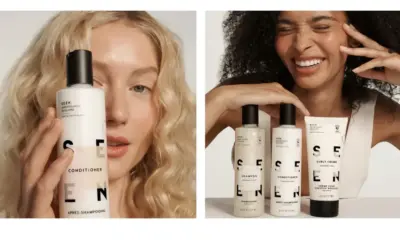Research & Trends
Sino-High Highlights Hydroxyacetophenone Preservative as a Solution for Sensitive and Allergy-Prone Skin Issues
Hydroxyacetophenone is increasingly recognized for its antioxidant benefits and its ability to modulate the activity of the COX-2 enzyme.

As demand for gentle skincare increases due to concerns over atopic dermatitis, we highlight hydroxyacetophenone, a preservative suitable for various personal care products. Personal Care Insights spoke with Boya Wu, the assistant manager of business development at Sino-High, to explore this sustainable ingredient further.
Our previous reports indicated a shift in the cosmetics industry, with traditional preservatives being replaced by multifunctional antimicrobial ingredients in products for infants and sensitive skin. Research has identified preservatives as the “most prevalent contact allergens in cosmetics for babies and children.” Alternatives like ethylhexylglycerin, caprylyl glycol, and p-anisic acid are gaining traction, especially in sensitive skin formulations.
Sino-High believes its anti-irritant ingredient can shape the future of sensitive skincare product development, offering improved formulations, expanded applications, and sustainable sourcing.
How do you see hydroxyacetophenone evolving to meet the growing demand for sensitive skin products?
Wu: Hydroxyacetophenone is increasingly recognized for its antioxidant properties and its ability to regulate the COX-2 enzyme, which plays a key role in inflammatory responses. This makes it an invaluable component in products designed for sensitive skin. I envision its evolution through enhanced formulations, broader applications, and increased consumer awareness.
As research progresses, we can anticipate more sophisticated formulations that maximize hydroxyacetophenone’s benefits. While it’s commonly found in serums, creams, masks, and wet wipes, its applications could extend to aerosol products, shampoos, and mouthwashes, providing comprehensive solutions across various product categories.
Consumers are becoming more knowledgeable about cosmetic ingredients, often favoring products with safe, non-controversial components. With continued innovation and adaptation, hydroxyacetophenone is well-positioned to remain a key ingredient in the evolving landscape of sensitive skincare.
With consumers seeking effective and safe products for sensitive skin, what trends are you noticing in skincare that incorporate hydroxyacetophenone?
Wu: We’re observing a rise in preservative-free and safer products with minimal ingredients sourced responsibly.
- Preservative-free: Hydroxyacetophenone enhances the efficacy of preservatives, allowing for lower concentrations of traditional preservatives. When combined with ingredients like 1,2-hexanediol, it creates an effective antimicrobial system that eliminates the need for conventional preservatives.
- Minimalist approach: Often utilized as a multifunctional ingredient, hydroxyacetophenone offers antimicrobial and antioxidative benefits. This aligns with the minimalist trend, where fewer ingredients achieve multiple effects.
- Sustainability and transparency: Consumers are increasingly concerned about the environmental impact of their skincare products. Brands are responding by sustainably sourcing hydroxyacetophenone and ensuring transparency in their ingredient lists.
Sensitive skincare is complex, influenced by various triggers like environmental factors and stress. How does hydroxyacetophenone address these needs?
Wu: Numerous factors can lead to skin irritation and discomfort, and we understand the challenges faced by formulators. Hydroxyacetophenone addresses various triggers with its unique properties.
- Soothing agent: It inhibits COX-2, an enzyme associated with irritation, making it beneficial for sensitive skin that easily reacts to external stressors.
- Antioxidant benefits: Hydroxyacetophenone also provides antioxidant protection against oxidative stress caused by free radicals, which is crucial for sensitive skin susceptible to damage from environmental pollutants and UV rays.
- Versatility in formulations: It can be incorporated into a wide range of skincare products, from cleansers and toners to serums and moisturizers, ensuring sensitive skin can benefit from its properties at every step of the skincare routine.
How is Sino-High addressing sustainability demands, particularly for hydroxyacetophenone?
Wu: Sino-High is committed to meeting the demand for sustainability and environmental friendliness through several initiatives:
- Pioneering ESG awareness: As a public company, we released an ESG report in 2024, establishing Sino-High as a leader in ESG awareness in China.
- Global carbon compliance: We have obtained carbon footprint certificates, reflecting our commitment to global carbon emission goals.
- Adherence to global customer requirements: Sino-High ensures that all our products comply with the environmental and safety standards set by our customers.
As more brands emphasize transparency and clean beauty, how do you ensure the purity and safety of hydroxyacetophenone for sensitive skin?
Wu: Hydroxyacetophenone is ideal for clean beauty formulations, reducing or eliminating the need for traditional preservatives that may pose risks. We ensure that every batch of hydroxyacetophenone is at least 99.8% pure through rigorous quality testing. We are confident that our product complies with cosmetic regulations in the US, EU, and Japan. Having manufactured hydroxyacetophenone for the past decade, we maintain consistent quality.











